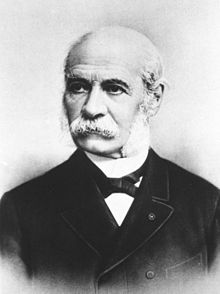This is an old revision of this page, as edited by Addbot (talk | contribs) at 15:20, 26 February 2013 (Bot: Migrating 6 interwiki links, now provided by Wikidata on d:q565381 (Report Errors)). The present address (URL) is a permanent link to this revision, which may differ significantly from the current revision.
Revision as of 15:20, 26 February 2013 by Addbot (talk | contribs) (Bot: Migrating 6 interwiki links, now provided by Wikidata on d:q565381 (Report Errors))(diff) ← Previous revision | Latest revision (diff) | Newer revision → (diff)
Paul Alexandre René Janet (30 April 1823 – 4 October 1899) was a French philosopher and writer.
Biography
Born in Paris, he became professor of moral philosophy at Bourges (1845–1848) and Strasbourg (1848–1857), and of logic at the lycée Louis-le-Grand, Paris (1857–1864). In 1864 he was appointed to the chair of philosophy at the Sorbonne, and elected a member of the academy of moral and political sciences.
He wrote widely on philosophy, politics and ethics, on idealistic lines: La Famille, Histoire de la philosophie dans l'antiquité et dans le temps moderne, Histoire de la science politique, Philosophie de la Revolution Française, etc. However, in the opinion of 1911 Encyclopædia Britannica, these writings are not characterised by much originality of thought. In philosophy he was a follower of Victor Cousin, and through him of G. W. F. Hegel. His principal work, Théorie de la morale, owes much to Immanuel Kant.
Works
- The Materialism of the Present Day, a Critique of Dr. Büchner's System ISBN 1152057863
References
 Chisholm, Hugh, ed. (1911). Encyclopædia Britannica (11th ed.). Cambridge University Press.
Chisholm, Hugh, ed. (1911). Encyclopædia Britannica (11th ed.). Cambridge University Press. {{cite encyclopedia}}: Missing or empty|title=(help)